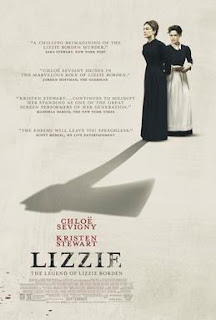Lizzie
Technically, the Borden murders are an open case, just like the Jack the Ripper killings, which certainly adds to the allure, as there are numerous theories. The film has an idea of who did it and how, and I won't spoil it here, but it couldn't have happened that way. The problem with seeing a movie about something historical that you know a lot about is getting past the inaccuracies. While Lizzie is no documentary, and takes enormous liberties, it's a solid piece of work.
Lizzie Borden was a spinster, over thirty and unmarried, and living under her father's (Jamey Sheridan) iron rule. The film doesn't heap insults on her step-mother (Fiona Shaw), but the film makes Andrew Borden out as a monster and a cheap-skate (he was certainly the latter). In the film, he pays visits to the maid (Kristen Stewart) for nocturnal assignations which are not welcomed.
The gimmick of this film is making Stewart, as Bridget Sullivan, much more of a character than she is portrayed in most tellings of this story. It's no secret, given what occurs in the trailer, that Lizzie and Bridget have an affair, which adds another motive for Lizzie--her father spies on them, and she's afraid she'll be sent to the madhouse (Sheridan calls her "an abomination"). There's also a subplot involving Uncle John (Dennis O'Hare) that is made up completely out of whole cloth.
But much of the film is accurate, and Lizzie Borden has become something of a metaphor for the repressed women of Victorian society. She was probably a lesbian, and she wanted to be independent and a woman of society, but could do nothing without her father's permission, as he controlled the purse strings. If a woman was unmarried and unemployed, she had absolutely no power, and she wouldn't have been allowed to work even if she wanted to. The wielding of a hatchet in this story can be seen as a hacking away at society's restraints (Lizzie ended up inheriting half of her father's considerable fortune and living a life that she wanted, though she was shunned by most of society).
The film looks terrific, with cinematography by Noah Greenberg. It may be the most contemplative movie about a double murder you'll likely see, as there are many shots of passing clouds and birds in flight, but they don't seem pretentious and give the film a great texture.
Sevigny, who also produced the film, is terrific, as a woman who may not have all her marbles but is sympathetic, even if is she is a killer. Stewart, as a working woman and immigrant who can do nothing to risk losing her job, plays yet another emotionally repressed woman, speaking in an Irish accent that is hard to hear. Many people think Stewart is a bad actress, but I disagree--she just chooses roles that are all about subtlety and women who don't talk a lot. She needs to play a comic role; someone who won't shut up.
Lizzie also makes good use of sound effects. Mrs. Borden gets hit in the head quite a few times, and the sound it makes is rather gruesome. I wonder if they used melons.



Comments
Post a Comment